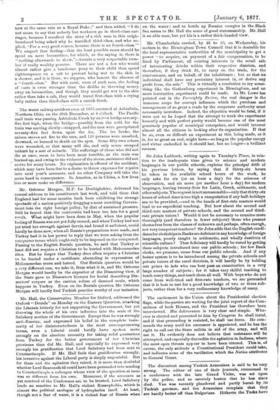Sir John Lubbock, writing again to Tuesday's Times, in rela-
tion to the inadequate time given to science and modern languages in our public schools, explains the principal drift of his previous letters, by saying that if thirty-six hours be taken as •the available school hours of the week, he only asks for six (or an hour a day) for the sciences of observation, and six more (or another hour a day) for modern languages, leaving twenty-four for Latin, Greek, arithmetic, and other subjects. The request is not unreasonable--only that thirty-six hours of school-time is too high a computation if any half-holidays are to be provided,—and in the hands of first-rate masters would lead to no superficial teaching. But how about the second and third-rate masters of private schools, and the second and third- rate private tutors? Would it not be necessary to examine more thoroughly (and therefore in fewer subjects) those who present themselves from the classes of unknown and perhaps, often enough, not very competent teachers? Sir John adds that the English candi- dates for clerkships in Banks are deficient in any knowledge of foreign languages, poorly taught in arithmetic, and wholly destitute of scientific culture? That deficiency will hardly be cured by getting these subjects introduced into our public schools ; for few Bank clerks, we presume, come from our public schools. And if any better system is to be introduced among the private schools and private tutors of the rural districts, it will hardly be by holding out prizes to lads who can best pass an examination in a very large number of subjects ; for it takes very skilful teaching to teach many things, and teach them all well. With boys who do not come from well-tried and first-rate teachers, we are persuaded that it is beat to test for a good knowledge of two or three sub- jects, rather than for a very rudimentary knowledge of many.









































 Previous page
Previous page